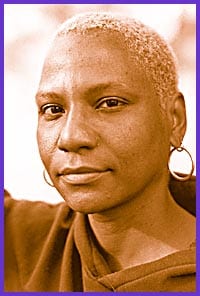For Makeda Silvera it has been a long, narrow, at times rough, road since writing children’s stories in the 1970s and having them rejected for publication. The journey to being published was especially difficult. “There were no real role models, except for a few black American authors,” says Silvera.
From her first book, Silence: An Oral History Of Caribbean Women Domestic Workers, to her collections of short stories Remembering G and Her Head A Village, Silvera knows too well how to make her writings work for her.
She had to carve out a niche for herself during her early involvement with United African Improvement Association and African Liberation Society. When these mainstreams anti-racism organizations refused to discuss gay and lesbian sexuality and sexism, she had to turn to the power of the pen to protest.
And even though black lesbians were invited to white feminist spaces back then, they still had to know their place. Silvera – single mother, writer, editor and activist – is used to making her own space.
Out of all these prejudices, Silvera became a pioneer of the city’s black gay and lesbian organizations. One of her proudest moments was being the editor of Fireweed’s women of colour issue; the journal was seen as exclusively white. She is also the co-founder and editor of Sister Vision Press.
In her recently released first novel, The Heart Does Not Bend, published by Random House, Jamaican matriarch Maria Calloway migrates to Canada with her granddaughter Molly to join her adult children in Toronto. She leaves behind her gay son Mikey who will hopefully tend to the homestead and collect the rent from tenants. Mikey, however, is caught up in his own career as a dressmaker and in his relationship with Frankie, the son of a wealthy hotelier.
Molly, the narrator of the story, takes us through the lives of the Calloway family, from her childhood in Jamaica to her arrival in Canada: The estranged relationship she has with her own mother and the ensuing struggle between Maria and her son’s wife; the unconditional love Maria has for her grandson Vittorio, in spite of his criminal activities and the embarrassment he has brought upon the family.
When Maria retires to Jamaica with Molly, Maria is hospitalized and dies. When her will is read, all her fortune goes to the wayward grandson Vittorio, leaving her own children and Molly, the granddaughter she nurtured from a baby, with nothing but painful memories.
Silvera came from a strict Caribbean family and when she arrived from Jamaica as an innocent 10-year-old in Toronto, she was not allowed to mix and mingle with the kids outside her home, so a lot of her time was spent developing a love for reading. And extra-curricular activities centred on family gatherings.
It is perhaps at these gatherings that the future writer accumulated her stories and characters. Silvera’s characters speak in thick Jamaican patois, a language very different from her short stories. Silver says that In The Heart Does Not Bend, she employs “the language the characters wanted to talk in, especially Maria. Writing any other way will take away from it.”
What motivated Silvera, an elder in the lesbian community, to write a novel about a Caribbean matriarch and the vicious cycle of teenage pregnancy? According to her, on one level, she wanted to explore migration and how it affects people, primarily women from the Caribbean coming to North America. On the other, as a lesbian, she also wanted to uncover gay family members in the Caribbean diaspora, to understand their level of invisibility; how these family members are often seen as outcasts. Silvera describes the book as “collective experience of a people.”
And rightly so. Silvera’s characters are very familiar; they instill a nostalgia of good old Caribbean socialization. Silvera freezes moments in our lives as children with poetic postulation. Through the friendship of the young Molly and her neighbour Petal, a reader may recall the times when they explored their own sexuality.
The Heart Does Not Bend is a must read, more so for Caribbean migrants and their descendants. It is an oral herstory of migration, women and sexuality – recurring themes in Silvera’s work. However, in her latest novel, these themes have found a bigger canvas.
The Heart Does Not Bend.
Makeda Silvera.
Random House.

 Why you can trust Xtra
Why you can trust Xtra


